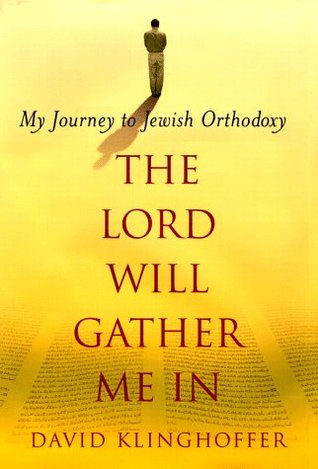A compelling personal narrative about his inner life serves as the occasion for David Klinghoffer to engage in a dialogue with Judaism. His story, weaving the personal with the public, carries him from adoption by a Reform Jewish couple in California to deep reflection on the meaning of “being Jewish” and the interplay of family and faith. What he has discovered in his journey—from secularity to Reform, thence Conservative, and finally a humanistic Orthodoxy—is that Judaism is not a matter of blood and kinship but of faith and love of God. And he spells out precisely what that faith and love comprise.
This is not an autobiography in any narrow sense; Klinghoffer only uses himself as the occasion to tell the story of faith. He states the outcome in these words:
It took a trip to Sweden [where he found his biological mother’s family had no links to Judaism] to make me realize . . . the error at the heart of the tribal conception of Jewishness, an error I had shared in. It is the belief that blood will persevere in the absence of belief . . . I became a Jew for one reason: because I reached the conclusion that Judaism is true. . . .
. . . I say that Mt. Sinai is in Stockholm. For me, it is at any rate. Torah has a very good reason for keeping quiet about where the event of Sinai took place: because it happened, and happens, everywhere. . . . for all Jewish souls who have lived after the Exodus, Sinai is not a place, it is an experience. Our Mt. Sinai is wherever we happen to be when we realize about Torah what our earliest spiritual ancestors realized on the day that God’s voice whispered to them amid smoke and fire: that Torah is entirely Truth, that it came from God, that it is His Presence in our lives.
I do not think any finer statement of the condition of Judaism has been expressed in Judaic religious writing in American English.
Rejecting (for reasons elaborately set forth) Reform and Conservative Judaism, Klinghoffer, in his choice of Orthodox Judaism as the authentic embodiment of the Torah, should not be classified as just another modish reversioner. He is much too critical to trade the Reform Judaism in which he was raised, and which he found formal and social, for an Orthodoxy of equal formality—but about different things and equivalent tribalism. Indeed, some of the best writing in the book conveys his critique of the Orthodox Judaism he finds as inauthentic as the Reform that he left. And the carefully negotiated position—a brilliant critique of telephone-book Judaism, of doing things by the book without regard to issues of context and meaning—that he assumes in regard to the Halakhic discipline of Judaism will not persuade a considerable sector of Orthodox Judaism today of its authentic Orthodoxy. Klinghoffer’s extensive exposition of the thought of.Abraham Joshua Heschel’s greatest work, God in Search of Man, situates him squarely at the center of the observant Judaic consensus today.
Arguments in American Judaism in behalf of religious belief and practice through personal narrative find their model in Herman Wouk’s This Is My God, certainly the literary masterpiece of Judaic apologetics in the American language. In the recent past, two significant works lune continued this sturdy tradition: Leon Wieseltier’s Kaddish, about the year he spent in mourning for his father—a work of learning transmuted into religious understanding and conviction—and now Klinghoffer’s book. The two bear comparison: Wieseltier is the more learned and illuminating; Klinghoffer, the more painfully self-revealing and therefore humanly the more compelling. Both show how the powerful intellectual gifts of ordinary-Jews, not rabbis or professors of Jewish studies, take up the service of the Judaic religious challenge of the hour. These books are classics of Judaic religious expression, testimonies to the vitality and power of the Torah, oral and written, to sanctify the life of holy Israel. With figures such as these engaged by its challenge to intellect and sensibility, Judaism in America enjoys an intellectual renaissance with no parallel in modern times.
For the sake of full disclosure, my own prejudices require exposure. First, Klinghoffer was my student at Brow n, but at a point at which what I had to offer and what he sought to discover scarcely intersected; second, in 1954-55, as Heschel’s student assistant, I typed God in Search of Man, and have always regarded that service to him as the high point of my education at the Jewish Theological Seminary of America.
[The Lord Will Gather Me In: My Journey to Jewish Orthodoxy, by David Klinghoffer (New York: The Free Press) 262 pp.. $24.99]

Leave a Reply